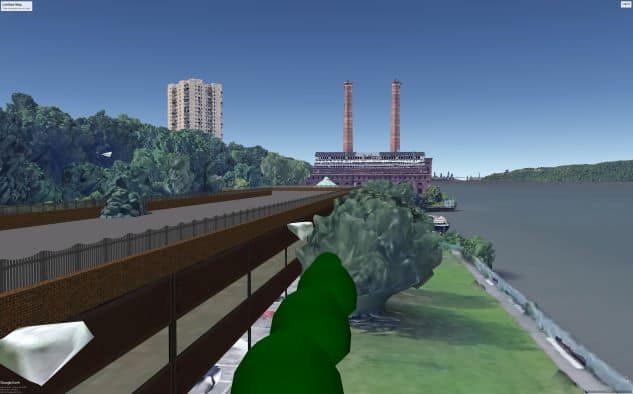
“Plan A” © Friends of Trevor Park 2021
By Dan Murphy
A consortium of Yonkers community groups has joined forces to prevent a private developer from building a parking garage in JFK Marina, the sole remaining expanse of open public parkland along the Hudson River waterfront in Yonkers. The Marina, with its unimpeded, panoramic views of the Palisades, is considered by many to be one of Yonkers’ greatest public assets. The park provides small boat access to the river, lawn at water-level with benches and grass for picnicking, lounging and ball playing, fishing piers, and a pavilion with grills and electricity that is leased for parties and which, before the pandemic, was in demand all summer long.
While the condition of the parkland has been left wanting in the past, recently the City of Yonkers gave the Marina a facelift, reinforcing the shoreline, building new piers and planting grass. “Consuming the Marina with a parking garage for a private development eliminates the possibility that it can ultimately live up to its potential as one of Yonkers’s great public spaces,” says Yonkers resident Elliot Scott.
The parking garage proposed for the Marina is a project of the Lela Goren Group (LGG), the developer planning an adaptive reuse of the long-abandoned Glenwood Power Plant, which abuts the Marina’s south end. The footprint for their garage, which LGG asserts is the smallest they can possibly go to satisfy their parking needs, stretches nearly 1,100 feet long, running across a large swath of the Marina.
“Some members of the Yonkers community think the renovation and repurposing of the power plant will be a great boon to Yonkers,” says Stephen Wagner, vice president of the Yonkers Committee for Smart Development (YCSD). “Our focus, though, is on the Marina, on the garage. We cannot accept the taking of a public benefit and turning it into a private benefit intended primarily to serve the interests of one developer.”
That is why, Wagner explains, YCSD has united with other community groups to prevent the developer from gaining approvals to build in the Marina. “We believe deeply that this is the right course for us as citizens and we believe it is also the necessary course for our elected representatives to adopt.”
Since December, consortium representatives have been meeting with government officials, with the developer, and have been reaching out to the public to build awareness around the developer’s plans. The groups’ petition has gathered more than 700 signatures from Yonkers residents since it went online on January 20.
Notably, nearly 300 who signed also took time to voice their concerns in the comments section of the petition.“This is planning at its worst,” Bob Walters writes in one entry.
In community meetings on December 29 and January 21 convened by City Council District #1 Councilwoman Shanae Williams and hosted on Zoom by the Yonkers Public Library, the developer responded to the community outcry, stating that the garage, whose footprint would occupy an existing ground-level parking area in the Marina, will actually provide additional parkland by creating a deck atop the two-story garage that will be fashioned into a park. In presenting its vision, the developer extended an intention to work with Yonkers residents to find the most desirable rooftop configuration, indicating that it could include playground structures or even a soccer field.
“The developer is offering a grossly unequal tradeoff,” says Wendy Scheir, co-founder of the Friends of Trevor Park, another of the core groups opposing the garage. “We will not debate which amenities they should put on the deck of their garage. Our point is that a garage in the Marina will irreparably damage the intrinsic beauty and feeling of expansiveness there, spoiling the very features that make the place so special.”
The one point on which all sides of the debate agree is that there is no simple solution to LGG’s parking problem. The power plant sits on a site in a neighborhood of tightly-packed apartment buildings, on the west side of Metro North’s Glenwood train station, making access to the plant from the east and south difficult. West of the plant lies the Hudson River. To its north lies JFK Marina. Barbara Smith, president of the Hudson River Community Association, another anchor organization opposing the Marina garage, has an answer for that: “The developer should be required to place their parking on their own land – not ours.”
Perhaps the most pressing reason for preserving the Marina’s open space and unfettered public access, consortium representatives maintain, is that JFK Marina provides a critical “backyard” to hundreds of Yonkers apartment dwellers in an area where there is already a documented lack of open, green space.
Area residents point to the Marina garage as “yet another instance of environmental racism.” “Hey, Mayor Mike and Yonkers City Council,” writes Julie Weiner on the petition. “How about showing us that green spaces and waterfront vistas in African-American and Latin-X communities matter to you?” Christine McSweeney agrees: “There are so few parks on this side of Yonkers. How unfair to the residents, especially the children who need green spaces for their mental health!”
Before setting its sights on JFK Marina, LGG had hoped to put their parking facility and to cut two long roads through the middle of Trevor Park, a popular public park just east of the Marina. A neighborhood outcry at the end of 2020 prompted the developer to abandon the Trevor Park plan. But opponents claim that the alternative, JFK Marina, is just as disastrous a site for the garage as Trevor Park, if not more so.
While the consortium’s focus is on keeping the garage out of the Marina, the group is eager to work with the developer to identify and envision such a site and have conveyed this message. “There are solutions to LGG’s parking needs that would not disrupt, compromise, and privatize public land,” says Mike Hertz, of the River Communities Coalition of Yonkers, another anchor group in the consortium.
On the petition, Joseph Eugenio frames the choice for Yonkers officials in starker terms: “I’m totally against this garage and will not support the re-election of anyone who approves it.”
“We are passionate about our neighborhood parklands,” Wagner states. “We know that there are realistic options that leave our parks alone. And we will continue as a united community to make our opposition about this egregious development known. We intend to ensure that the JFK Marina is protected as public land for future generations.”
There are several legal steps that would have to take place before the plan to build a parking lot at JFK Marina becomes a reality. First the City Council would have to request “Parkland alienation,” which occurs when a municipality wishes to sell, lease or discontinue the use of municipal parkland. Parkland alienation can be applicable to every municipal park1
in New York State, whether owned by a city, county, town or village.
In order to convey parkland to a non-public entity, or to use parkland for another purpose, the municipality must receive prior authorization from the New York State Office of Parks, Recreation and Historic Preservation (State Parks) in the form of legislation enacted by the New York State
Legislature (Legislature) and approved by the Governor. The bill by
which the Legislature grants its authorization is commonly referred
to as a parkland alienation bill.
After the alienation, there is usally a trade of land so that the parkland is replaced. None of those discussions have publicly taken place, nor have they yet been discussed by the coaltion.





